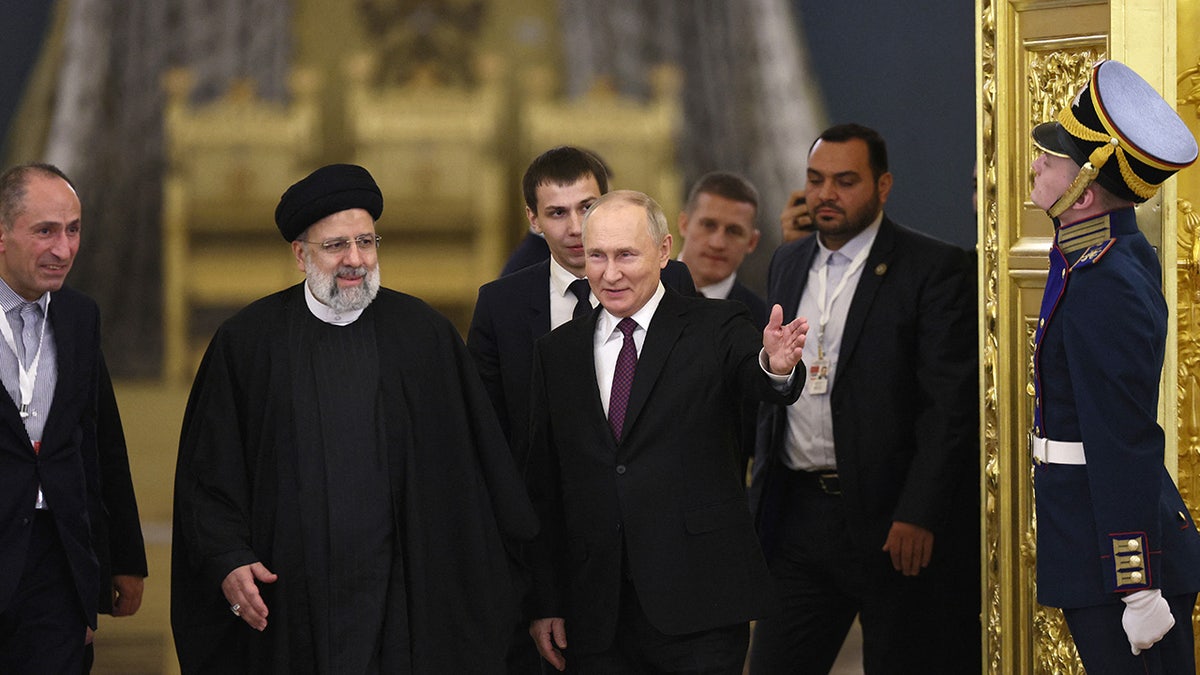Russia is reportedly moving forward with a deal to purchase short-range ballistic missiles from Iran.
The Wall Street Journal first reported on the tentative sale agreement on Thursday, citing unnamed U.S. officials.
The officials say the missiles would boost Russia’s ability to target Ukrainian infrastructure at a time when support for continued U.S. military assistance for Kyiv is waning in Congress.
“The United States is concerned that Russian negotiations to acquire close-range ballistic missiles from Iran are actively advancing,” one of the U.S. officials told the Journal. “We assess that Russia intends to purchase missile systems from Iran.”
Russian President Vladimir Putin, left, shakes hands with Iranian President Ebrahim Raisi during their meeting in the Kremlin in Moscow on Dec. 7, 2023. (SERGEI BOBYLYOV/POOL/AFP via Getty Images)
The officials told the Journal they do not believe the agreement has been finalized but predict the first deliveries of Iranian missiles could take place by the spring.
Moscow has already begun receiving ballistic-missile launchers and several dozen ballistic missiles from North Korea, the officials said.
Russia’s interest in obtaining Iranian missiles was first made apparent in mid-December, when a Russian delegation visited an Iranian training area to view ballistic missiles and related equipment displayed by Iran’s Islamic Revolutionary Guard Corps (IRGC) Aerospace Force, including its short-range Ababil missile, according to the U.S. officials speaking to the Journal.
The previously undisclosed trip came after Russian Defense Minister Sergei Shoigu visited the headquarters of the IRGC Aerospace Force in Tehran in September to observe a display of the Ababil and other missile systems, the officials said. At that time, Shoigu also met with Maj. Gen. Mohammad Bagheri, the chief of staff of Iran’s armed forces, and touted that relations between Russia and Iran were approaching new heights.
That visit came the same month Russian President Vladimir Putin and North Korean leader Kim Jong Un held a summit at a spaceport in Russia’s far east to pledge greater cooperation on economic and security issues. Several officials familiar with the transaction told the Journal that North Korea has since started to ship a range of weaponry to Russia, including, for the first time, short-range ballistic missiles to eastern Russia. The officials said the weaponry includes previously reported stocks of artillery.

Islamic Revolutionary Guard Corps military personnel are walking along Enghelab Avenue as an Iranian Kheibar Surface-to-Surface missile is being unveiled during the Ela Beit Al-Moghaddas military rally in Tehran, Iran, on Nov. 24, 2023. (Morteza Nikoubazl/NurPhoto via Getty Images)
Moscow’s approach could include increasing the number of missiles launched in a bid to overwhelm Ukraine’s antimissile defenses, as indicated by Russia’s efforts to increase supply through deals with North Korea and now Iran. Russia has already obtained many drones from Iran used in the Ukraine war, the Journal reported, and Moscow and Tehran are together building a new factory in Russia that U.S. officials assess could manufacture thousands of drones for fighting Kyiv’s forces.
There is growing concern from the U.S. that strengthening cooperation between Moscow and Tehran could bolster Iran’s military capability in the Middle East and an economy crippled by Western sanctions.
A United Nations Security Council resolution adopted after the 2015 Iran nuclear deal that prohibited Iran from exporting or importing some types of missiles and drones, as well as military technology used to produce and operate missiles, without the council’s approval, formally expired in October. In response, the U.S. slapped Iran with more sanctions intended to discourage Tehran’s missile trade and released a pledge with 47 other countries to stifle Iran’s sale of ballistic missiles and related technology.

Russian President Vladimir Putin, right, and Iranian President Ebrahim Raisi walk together following their meeting in the Kremlin in Moscow on Dec. 7, 2023. (SERGEI BOBYLYOV/POOL/AFP via Getty Images)
CLICK HERE TO GET THE FOX NEWS APP
Russia’s Foreign Ministry, however, said the U.N. ban on Iranian missile sales no longer needed to be followed – a move that contrasts with Moscow’s previous cooperation with the U.S., European nations and China in negotiating the 2015 nuclear deal with Tehran, as well as Russia’s 2017 support for the U.N. Security Council implementing sanctions against North Korea in response to its nuclear and ballistic missile activities. Since the Ukraine war, a former State Department official told the Journal, Russia’s foreign policy now focuses on “undermining U.S. interests.”